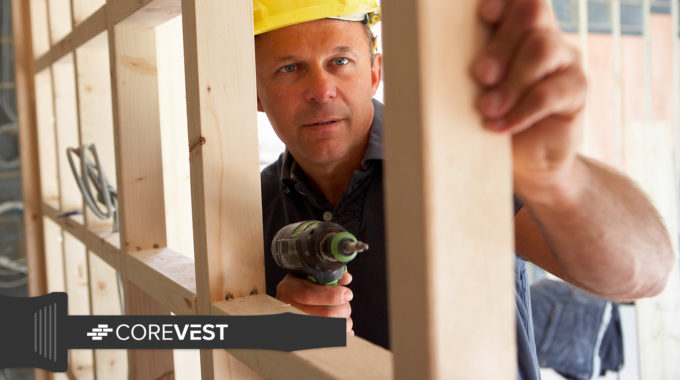DIY or Contractor? What’s right for your renovation project?

Let’s be real. Many of us have entertained the thought of taking a sledgehammer and pounding a few walls. Or, if you’re the Zen type like I am, then perhaps planting flowers in the yard would meet your desire to renovate. But, what about installing highly technical (and possibly dangerous) systems like electricity or plumbing? Unless you have experience working with these complex jobs – which require special tools and equipment – chances are, you’ll need to hire a professional.
Either way, if you’re fixing homes to flip or hold, you’ll likely need to answer the question: do it yourself (DIY) or hire a contractor? The answer really depends on a laundry list of considerations, but let’s break down the big three.
1. SAFETY
Remind yourself to “Check your ego, amigo” when you are faced with a project that may involve high levels of difficulty or danger. Think safety first, because some projects can literally kill you. Roofing, electrical wiring, and plumbing require advanced training and skill, and are potentially dangerous to you and your property. For instance, if you try and shortcut an electrical wire to avoid pulling out drywall, or if you misread a voltage detector, you could experience some serious consequences. Similarly, heavy power tools like saws, grinders and nail guns move at incredible speeds and are unforgiving. Needless to say, don’t wing it.
A good indication that a remodeling project or repair job might be too complicated to DIY is that it requires a permit. Each city has its own rules about measuring the cost and difficulty of remodeling projects, but even if it’s easy to obtain a permit, the fact that you need one should signal some caution.
2. EXPERIENCE
The second consideration is experience, or skill level. If you’re like my handyman, aka rehab addict dad, who has decades of experience smelling the timber air walking into Home Depot, then stop reading this and do it yourself already! However, no experience isn’t necessarily a deal breaker. Nowadays, you can read plenty of DIY books or watch YouTube channels like the DIY Network to learn how to handle easy repair jobs.
But, again, highly specialized projects that require expertise are best left to the pros. Otherwise, you run the risk of destroying your person and property. For example, we all know the damage that water can do to a house. So, it’s probably in your best interest to hire a plumber to do major plumbing jobs like moving bathrooms or kitchen fixtures. If you improperly install pipes that lead to water leaks down the line, it could weaken a wall and perhaps even collapse. At that point, you’re left with costly Monday morning hustling and quarterbacking – realizing that instead of saving money by doing it yourself, it wound up costing you even more.
3. TIME
Finally, a major point for consideration is time. And, since time is money, we can lump them together for this part of the conversation. Now, whether you value one over the other, retired or fully employed, cash-strapped or wealthy, follow this step-by-step method to figure out if it’s worth more to do it yourself or hire a contractor:
a. First, find out what the professional job costs. You can do this by either getting quotes from contractors, which would be most accurate, or you can visit websites such as HomeAdvisor, a platform designed to provide quick local estimates based on survey data from local homeowners.
b. Next, price out the DIY cost. This will include adding up the price for materials, tools, and permits (if applicable). Subtract the DIY cost from the contractor cost to determine your savings if you do it yourself.
c. After you’ve calculated your potential savings, estimate the time it will take you to complete the project. This can be difficult because you will need to take a hard look at your experience and capabilities. However, there are some helpful references like HouseLogic that offer time estimates for some DIY projects.
d. Once you have estimates for both savings and time, calculate your hourly wage by easily dividing your potential savings by your estimated time to complete the project. The result will be your per hour earnings if you were to choose the DIY route. So, ask yourself: are you willing to do the work for that wage?
The choice between DIY and hiring a contractor is more than just a matter of money. It’s a matter of carefully balancing finances, stress, safety, fast results, and professional-quality work. If you’re trying to scale multiple projects within a condensed timeframe, then perhaps standardizing the rehab process will improve your cost basis and enhance the overall experience. Most rental property owners decide to hire a professional, despite the higher cost, because of the potential for greater after repair value (ARV).
However, there’s one advantage of DIY that you can’t put a price on: your pride in showing off a job you did yourself. If nothing else gives you the same satisfaction as hosting a Friendsgiving in your newly remodeled kitchen and dining room, or finely refinished deck that you built with your own hands, it’s enough to make up for all the time and work you put into it, even if the cost savings are minimal.
_____________________________________________________________________________________
CoreVest is a leading provider of financing solutions to residential real estate investors. We provide attractive long-term debt products for stabilized rental portfolios as well as credit lines for new acquisitions.
For more information about how CoreVest can help grow your rental and rehab business, please call 844.223.2231 or submit our contact form.
#IG